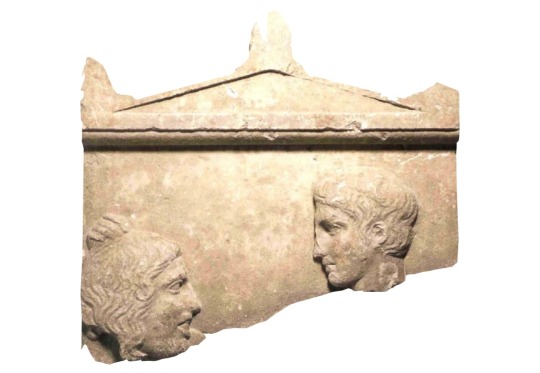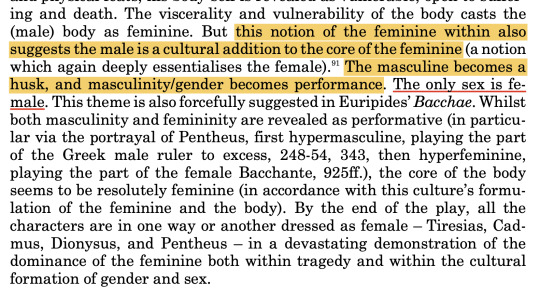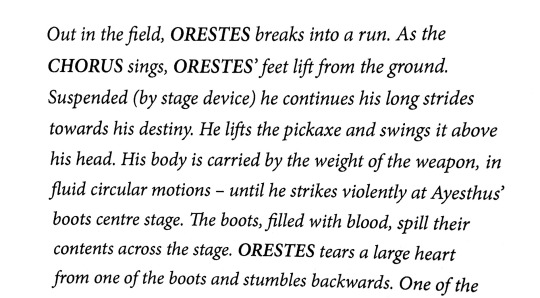#bodycostume
Text
ancient greece had some weird notions of the female going on. like what do you mean the innermost nature of women is the concealment of their nature? what is pandora an imitation of? if women are by nature deceptive, do they in fact reveal the truth of what they are in using their bodies to deceive? can you cover covering itself?
#ran into these roadblocks the last two times ive talked with my advisor#like. what does it mean when a woman adorns herself???? dead end. changing the subject!#pretty sure this* is a turtles all the way down situation. or an ogres-are-like-onions situation#*this (women)#absolutely FASCINATED by the potential implication that the core essence of womanhood is to lack a core essence.#so now i probably need to read gender theory#bodycostume#mine
283 notes
·
View notes
Text
keep thinking now about the idea of the ancient greek stage building as a doorway into death, which is separated from the stage (the space of the living) by the screen of the skene. cassandra calls it as much ("the gates of hades") when she enters the house of atreus. by convention characters cannot die on stage but must exit, usually into the skene, to be killed. cassandra's just extra explicit about it because of her foresight, but every entry into the stage building is a step into death. and then some people come back out of it!!!
#polymestor goes with his sons into death but then is dragged back...#killers like clytemnestra and orestes take their victims into death and leave them there#the origin point of these thoughts is actually oedipus at colonus#but VERY much hecuba and all three electra plays and the classic sophoclean *she exits silently into the house to kill herself*#also the way phaedra and hippolytus invert each other in death and directionality#it'd be interesting to do antigone with a setting switch during the choral ode where she does her own lament#so that the skene becomes the cave where she's imprisoned and then turns back into the palace for the last scene#mine#bodycostume#sorta. i think stage space plays into this somehow
355 notes
·
View notes
Text
wish the piraeus archaeological museum had a public catalog but hey everyone check out this c. 420-410 funerary stele from salamis with a tragic actor staring at his mask

#new mental image for the mask of apollo even though the dates arent right#the eternally open mouth of the mask facing the eternally closed mouth of the actor!#context is that i went looking for 5th century depictions of tragic masks to see if they had chins (they did)#bodycostume#mine
196 notes
·
View notes
Text

ah yes the three genders: naked, clothed, and disguised
#fascinating implication actually. that the ancient greek alignment of the female with the body#and the association of the female with mimesis may be at odds with each other#bodycostume#bassi acting like men: gender drama and nostalgia in ancient greece#this is from the summary of ch 3 she gives in the introduction#mine
153 notes
·
View notes
Text
greek tragedy is like. if you put on clothes you are doomed. if you take off clothes you are doomed. good luck.
#thinking specifically of euripides' heracles and suppliants and bacchae for the former#and aeschylus' agamemnon and libation bearers are my go-tos for the latter#clytemnestra bares her breast hoping it's going to save her but it is in fact what seals her fate#would have to check polyxena's death narration in euripides' hecuba but i believe it's one or the other of these as well#also yael farber's haunted oresteia boots. love those. nobody even wears them and they are so haunted.#mine#bodycostume
192 notes
·
View notes
Text
i really need to spend more time thinking about heracles in greek drama. he's so distinctive, so instantly recognizable on his first entrance to the stage. old comedy is so interested in what it takes to construct a heracles on stage and how you can build one out of a lionskin and a club. and then tragedy is so interested in deconstructing heracles on stage, taking him apart piece by piece, covering his mask and removing his bow and his strength and his skin.
77 notes
·
View notes
Text
oooh the sequence of on-stage female disrobings in the oresteia, one in each play-- cassandra casting off her prophet's robe and priestly emblems in the agamemnon, clytemnestra baring her breast to orestes in the libation bearers, and the erinyes exchanging their monstrous regalia for the red robes of their new identity as the eumenides... it's not explicit in the text of the eumenides that they take anything off but they are discarding one identity in order to assume a new one that they put on as a garment, and even if they don't take off any part of their fury-costume it's still such a way to reverse and resolve the two disrobings in the earlier plays
#watch this post turn into a dissertation chapter#i have not paid nearly enough attention to the choephoroi breast-baring scene#both cassandra's and clytemnestra's disrobings precede their deaths#(bc to take off one's costume is to take off one's identity ie for the actor to take off the character and be done w/ them)#(and to disconnect identity/self and body in the same way as death disconnects soul/self and body)#but the (re)robing of the eumenides is about continued life and avoiding the cycle that leads to more death#bodycostume#mine#oresteiablogging#see how many thoughts i have when i do my reading in daylight hours
126 notes
·
View notes
Text
i really have to get into the distribution of roles among the three actors. just saw a footnote saying that the only other voice in antigone that matches the authority and assurance with which antigone speaks is tiresias, who would have presumably been played by the same actor. well.
#i saw a production of antigone recently where the director (and maybe translator?) was clearly very nervous about minor characters#and the tendency in ancient tragedy (under the limit of three actors) to have a character show up for a scene and never be mentioned again#but tiresias was the one place that didnt play out and the only place they were comfortable having a one-scene character#how is a greek chorus like a lawyer#mine#bodycostume
68 notes
·
View notes
Text
very interesting that when mnesilochus tries to parse agathon's gender in the thesmophoriazousae he picks up on an excess of the signifiers that a person actively wears/uses/carries in accordance with their social role (a barbiton AND a saffron robe, a lyre AND a hairnet, an oil-flask AND a bra, a mirror AND a sword) and a total lack of any bodily signifiers (NEITHER penis NOR breasts). agathon's performance of gender is pointing in all directions and confuses mnesilochus but when he tries to look through that performance for some immutable reality behind it there's nothing there to see.
114 notes
·
View notes
Text
what if i write a dissertation about how actors wear the characters as costumes and characters wear the actors as bodies in greek tragedy. what if.
#this is how i am conceiving of the project right now who know where it goes from here#sophocles' electra (where aegisthus wears agamemnon's costume) and icke's oresteia (where aegisthus wears agamemnon's actor)... thank you#silence also plays into this. somehow. idk still figuring it out.#mine#bodycostume
104 notes
·
View notes
Text
i'm sitting on a half-written abstract about agamemnon/aegisthus casting in the oresteia that i can't finish because i'm being driven crazy by the implications of agamemnon and orestes being played by the same actor in ancient performances of the entire trilogy. the son is literally made entirely and exclusively out of the body of the father with no sign of the mother. apollo's argument in the eumenides about paternity and mothers not contributing anything to the formation of the child isn't quite so absurd if the orestes standing before him is physically an exact repeat of agamemnon.
52 notes
·
View notes
Text

there's only one gender, the human gender
#kind of a joke but also VERY real for the ancient stage#cue the agathon scene in the thesmophoriazusae. again. (this is what is happening there too)#katrina cawthorn 2008 becoming female: the male body in greek tragedy#mine#bodycostume
34 notes
·
View notes
Text
slowly reconciling myself to the fact that clytemnestra's breast is absolutely going to play a large role in my dissertation. like why write a scene like that for men playing women if not to emphasize the dissonance between character's body and actor's body???
#might have to do a study of references to on-stage characters' breasts in extant tragedy actually#mine#bodycostume
27 notes
·
View notes
Text

Katrina Cawthorn, Becoming Female: The Male Body in Greek Tragedy (2008)
47 notes
·
View notes
Text
loving this distinction between the body of the actor which is the object of the audience's gaze and the body of the character which is the object of speech and dialogue
#not sure that's exactly how i'd draw the line but it's such an interesting division!#the performed vs the textual body...#in that speech/dialogue is the written/textual part of performance#mine#bodycostume
38 notes
·
View notes

